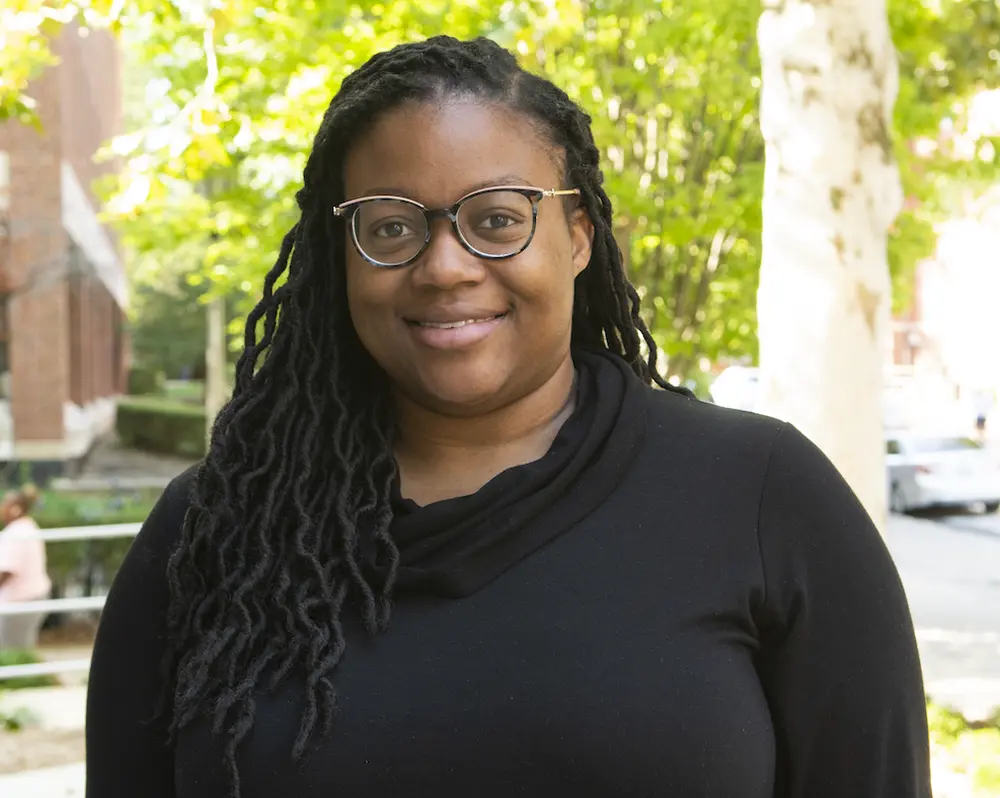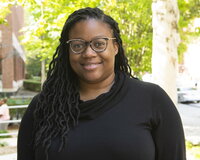
Dr. Jhewelle Fitz-Henley joined the School of MCB in August 2023 as Assistant Director of Diversity, Equity, Inclusion and Outreach. She recently met with MCB PhD student Quang Nguyen to talk about her journey in science and reflect on mentorship and belongingness in science.
Can you tell us about yourself?
I’m a first-generation college graduate. In 2016, I graduated from the University of Illinois Chicago (UIC) with a bachelor’s degree in chemistry. While I was at UIC, I didn’t really know what I wanted to do as a career, but I knew I wanted to do something related to science. I worked on various research projects, ranging from designing dye-sensitized solar cells to natural products chemistry, trying to get a better understanding of what research was. After undergrad, I attended the University of Wisconsin Madison (UWM) to get my PhD in Pharmaceutical Sciences. For my PhD research, I worked on synthetic medicinal chemistry projects, spending many hours at the fume hood synthesizing novel molecules for antiviral drug discovery.
When you were a grad student, what hobbies did you enjoy outside of lab?
I’m a big sports fan, so I love to watch and play sports. At UWM, I attended many women’s volleyball and basketball games. I also play recreational volleyball and softball. I would also describe myself a gamer because I love to play all types of tabletop games. I am starting a new DND (Dungeons & Dragons) campaign this weekend. I also play World of Warcraft (a multiplayer online roleplaying game).
Do you have a role model who has helped shape your career?
I’m really passionate about teaching and mentorship in STEM spaces. When I was a grad student, I was a Scientific Teaching Fellow with WISCIENCE at UWM. After completing that teaching fellowship, I continued to work with Dr. Cara Theisen as a graduate intern. She was really a great model for me for authentic mentorship and teaching. She clearly defined her expectations, incorporated my goals into our work, effectively communicated, and modeled how all of those things can change fluidly over time. She gave me space to think about how I mentored my own students and how I could engage with other mentors in my network.
What does DEIO mean to you and how would you define belongingness in STEM?
Diversity encompasses the differences between all of us. It includes the things we can see and also the things that we can’t. That means diversity also includes differences in experience, in thought, and in approach. Those differences can be incredibly advantageous in terms of creativity and innovation in science.
Equity is making sure that no matter what those experiences are, you are provided access to the same opportunities as those around you. This means that no matter what high school or undergraduate institution you attended, once you enter your program here you will receive the support that is necessary for you to reach your goals.
Inclusion is feeling welcomed in a given space. Students that feel included know that their questions will be welcomed, their ideas will be valued, and they will receive judgement-free support. This ties into belongingness, too. This is a space where I’m know that I’m included, and I also feel that I belong as well.
Outreach is reaching out to those who wouldn’t know to look for us otherwise and providing opportunities for engagement for those that are interested. I had two fantastic chemistry teachers in high school. I would not have understood what careers in science look like if they didn’t help me see the path. Outreach is giving back to the broader community so that they can see those paths forward as well. You don’t know what you don’t know, right? It’s our duty to enrich our community around us.
What challenges a diverse STEM workforce is currently facing?
A consistent issue has been belongingness. For the last few decades, there has been a large push to increase diversity in the workforce. However, once you have recruited [the diverse employees] there, there are less defined structures for supporting those valued employees. The challenge lies in creating a culture of belongingness that fits our ever-changing community, so that everyone is truly integrated.
I also think that biology students are becoming more interested in having access to training beyond the bench. It’s common to have biology students that are also interested in teaching, policy, consulting, technology, communication, data, and so much more. So, I think that building in, accepting, and welcoming that diversification of our knowledge/skill set is important.
What appealed to you about your current position, coming to UIUC and especially MCB?
I’m a University of Illinois system graduate and attended large public R1 institutions for undergrad and grad school. The land-grant mission of the university is well aligned with my personal values. I also really missed science. Although I’m not working at the bench, I’m still very interested in scientific innovation and discovery. I like problem solving and science gives you an opportunity to do that in a creative way. Opportunities to work in DEI positions in STEM are somewhat rare, so I had to take the chance. It’s also a bonus that I get to live closer to my family.
If you were on a deserted island, what laboratory instrument would you bring and why?
An Erlenmeyer flask to collect rainwater.
